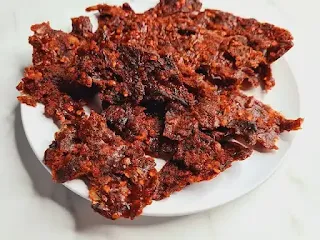Despite how delicious Suya and Kilishi are, you might not care about them after the discovery we are going to reveal. You had best get ready for what is coming for you if you are one of the people who contributes everyday to Suya or Kilishi merchants.
These details will stop you from getting into trouble for your love of meat, in addition to the government outlawing the production of the spiced meat Nigerians enjoy eating as a snack.
If you are a Nigerian living in your nation, there is a good possibility that you are familiar with one or both of these delicacies. You are already halfway to knowing Kilishi if you are familiar with Suya. Suya's family member Kilishi took the longest to dry out or smoke over heat. While the beef in Suya is chopped, the beef in Kilishi is dried, flattened seasoning that may be crushed with hands.
The consumption of Kilishi is surrounded by numerous debates. Its production procedures, potential health concerns from intake, and the opportunity to purchase phony kilishi are all enough to cause a lot of concern.
But we can't ignore Kilishi's positive effects on our health. Kilishi has many health advantages due to its high protein content and low carbohydrate content, which makes it a fantastic snack for bodybuilders and diabetics. This also includes its high salt content and total calories of 297 kcal.
You may learn everything you need to know about Kilishi and its special health advantages from this article.
What is Kilishi
The "Nigerian beef jerky" is called kilishi. Kilishi, which is closely connected to Suya, is roasted and dried meat, typically from a goat, cow, sheep, or occasionally from a camel, a donkey, or even a horse.
Kilishi are preserved for a long period of time without going bad thanks to the cutting, salting, and drying processes. The Labu "paste" that is used to coat the Kilishi gives it its exquisite flavor. This consists of peanuts, groundnuts, and various regional spices. Kilishi gets its spiciness and delicious flavor from this.
In Northern Nigeria, Kilishi has a long history that extends back to prehistoric times. Contradictory tales regarding how Kilishi came to be revolve around the need to preserve meat for a protracted period of time.
But first, let's learn more about kilishi's nutritional worth and health advantages.
Kilishi Nutritional Value
To ascertain the nutritional and chemical makeup of kilishi, a study from 2020 was conducted (beef jerky meat).
Kilishi was determined to be low in fat and high in protein according to the study. The important vitamins present in kilishi were sodium, potassium, calcium, magnesium, iron, and zinc. It also had niacin, vitamins A, C, and E.
About 395 calories are contained in each 100 grams of kilishi.
Seven Health Advantages of Kilishi
The following are some potential health advantages of kilishi consumption.
1. Strengthens your immune system and promotes growth
We all know how vital it is to eat protein, and kilishi is a rich source of it. The Kilishi snack has a protein value of up to 49g.
This is a substantial amount of protein to support tissue repair, growth, and immunity. Animal protein is essential for Kilishi's body's maintenance and functions.
2. Beneficial to cardiovascular health
Kilishi offers a significant amount of the vital minerals required to maintain your heart, blood, and fluids flowing normally.
Your blood vessels and blood pressure are stabilized by these minerals. Garlic is one of the primary components required to prepare kilishi. Because it includes the antioxidant allicin, which helps to reduce cholesterol levels, garlic is highly beneficial for the heart.
3. Contains no fat or cholesterol
One type of meat that you can consume in excess without gaining weight is kilishi.
Because fat is eliminated during preparation and the majority of the remaining fat falls off during drying, kilishi is a low-fat snack.
It has no cholesterol and no fat. This compensates for healthy eating and nourishing snacks.
4. Increasing body metabolism
A high-protein meal like kilishi can increase your metabolism. You can burn more calories throughout the day and night, including while you sleep, if you have a strong metabolism.
5. May aid in weight loss
Kilishi is a healthy option for people participating in a weight loss program because it contains no fat. No longer do you have to starve to death or work your bones raw.
Kilishi gives you the calories you require while not raising your insulin or fat levels. This does not imply that you should adopt a kilishi-only diet. Adding kilishi to your diet in between meals can aid in weight loss.
6. Supplies the body with energy
Kilishi is a good source of protein, low in calories and fat, and high in a number of vitamins and minerals, including zinc, iron, and vitamin B12, which gives the body the energy it needs to function.
7. Foods suitable for keto
One of the Nigerian dishes that is keto-friendly is kilishi. It is a high-protein, low-carb snack that offers more calories. Kilishi is typically without sugar unless the customer requests that the vendor add some for them. This is beneficial for people with diabetes or those following a low-carb diet.
Kilishi may be dangerous as well;
Another crucial factor is the setting in which the Kilishi is made. Occasionally, when the meat is being dressed, sliced, and slaughtered, the surface will become infected.
It is possible for it to become infected during cutting and drying with pathogenic microbes including Escherichia coli, Salmonella, Campylobacter spp., and non-pathogenic bacteria like Coliforms and Escherichia coli that cause spoilage and food poisoning.
While preparation hygiene may present certain health risks, it is otherwise healthy.
Find below some of the mind boggling reasons why you may never want to eat Suya and Kilishi again:
1. High risk of having cancer
High blood pressure and renal failure may result from the high sodium content.
Perhaps you are unaware that the methods used to make suya and kilishi could endanger your life if you consume them. When meat is roasted over an open flame, it frequently becomes charred and releases chemicals as it roasts. In particular, the processing of food over charcoal, wood, and gas produces polycyclic aromatic hydrocarbons. Consuming food that has been burned and chemically contaminated increases your risk of developing cancer. The growing fetus during pregnancy may have a low IQ and be susceptible to asthma.
2. Unhealthy surroundings
We'd be kind to excuse your support of Suya vendors by saying that hunger brings out the worst in people and might make it difficult for you to pay attention to your surroundings in an effort to block out any excruciating discomfort you might be experiencing. However, if you want to live a long life, make sure you eat something healthy the next time you are so hungry. Suya and Kilishi are frequently sold in filthy settings, which should make you wonder about the seller's hygiene and the prior processes the roasted meat underwent.
Do not shut your eyes to these small things as you may end up spending more in the hospital as a result of your negligence.
3. Contraction of diseases
If you don't practice healthy living, you could have pain in addition to discomfort. You run the risk of getting illnesses like Taenia Saginata if you don't properly prepare your meat before eating. It is a meat worm that develops covertly inside the body of the host. You could get headaches, nausea, diarrhoea, nausea, abdominal pain, and later stages of the worm's growth.
4. What sort of meat is used to make suya?
Nobody is attempting to instill unwarranted dread in you. You must pay special attention to the foods and beverages you consume. Even though it could be challenging to keep track of how each meal was prepared, you can take precautions and develop healthy eating habits. You can never be sure of the type and grade of beef being prepared as Suya and Kilishi because of the economic climate.
Conclusion
Kilishi is not only a well-liked and delectable Nigerian snack; it also has nutritional value and a few health advantages. The beef is a fantastic alternative for eating while traveling because it is portable and has a long shelf life.
Kilishi should only be eaten in moderation due to its high sodium concentration, though.



.jpeg)





0 Comments
We Cherish Your Comments.
Thank You.